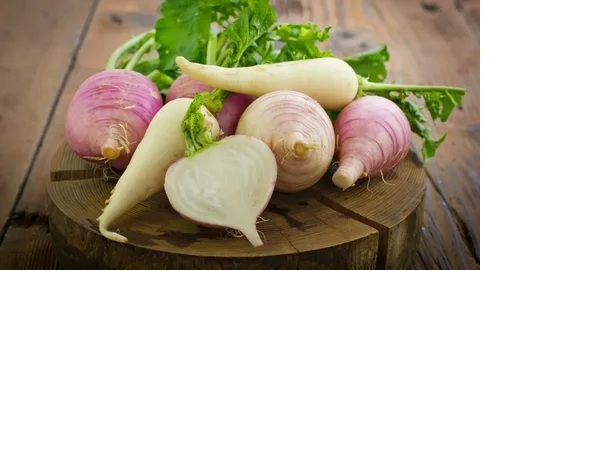Turnips: Nutrition, Calories, and Benefits
Turnips, a root vegetable belonging to the Brassicaceae family, have been cultivated for centuries and are prized for their crisp texture, mild flavor, and versatility in cooking. While often overshadowed by more popular vegetables like carrots and potatoes, turnips pack a nutritional punch and offer a host of health benefits. In this comprehensive guide, we’ll delve into the nutritional composition of turnips, their calorie content, and the numerous benefits they offer for overall health and well-being.
Nutritional Composition of Turnips:
Macronutrients
Turnips are low in calories and carbohydrates, making them a suitable choice for individuals looking to manage their weight or blood sugar levels. A 100-gram serving of raw turnips provides only about 28 calories and 6 grams of carbohydrates, making them a low-calorie, low-carb option for incorporating into various dishes.
Micronutrients:
Despite their modest calorie content, turnips are rich in essential vitamins and minerals, including vitamin C, vitamin K, folate, potassium, and manganese. These micronutrients play critical roles in immune function, bone health, blood clotting, and metabolism, making turnips a valuable addition to a balanced diet.
Fiber
Turnips are an excellent source of dietary fiber, with approximately 2 grams of fiber per 100-gram serving. Fiber is essential for digestive health, promoting regularity, preventing constipation, and supporting a healthy gut microbiome. Including turnips in your diet can help increase fiber intake and promote overall digestive wellness.
Health Benefits of Turnips:
Antioxidant Properties
Turnips contain antioxidants, such as vitamin C and various phytonutrients like glucosinolates, which help neutralize free radicals and reduce oxidative stress in the body. Consuming turnips regularly may help protect cells from damage, reduce inflammation, and lower the risk of chronic diseases such as heart disease and cancer.
Bone Health
Turnips are a good source of vitamin K, a nutrient essential for bone health and blood clotting. Adequate vitamin K intake may help reduce the risk of osteoporosis and fractures by supporting bone mineralization and calcium metabolism. Including turnips in your diet can contribute to overall bone health and density.
Heart Health
The fiber, potassium, and antioxidants found in turnips can support heart health by helping to lower blood pressure, reduce cholesterol levels, and improve blood vessel function. Incorporating turnips into a heart-healthy diet rich in fruits, vegetables, whole grains, and lean proteins can help reduce the risk of cardiovascular disease.
Weight Management
Due to their low calorie and high fiber content, turnips can be a valuable addition to a weight loss or weight management plan. The fiber in turnips helps promote feelings of fullness and satiety, reducing overall calorie intake and supporting weight loss efforts when consumed as part of a balanced diet.
How to Enjoy Turnips:
Raw
Turnips can be enjoyed raw, either sliced or grated, and added to salads or slaws for a crunchy texture and mild flavor. Pair raw turnips with leafy greens, citrus fruits, and a light vinaigrette dressing for a refreshing and nutritious salad.
Cooked
Turnips can be cooked in various ways, including boiling, steaming, roasting, or sautéing. Cooking turnips enhances their sweetness and softens their texture, making them a delicious addition to soups, stews, stir-fries, and side dishes. Try roasting turnip wedges with olive oil, garlic, and herbs for a flavorful and satisfying side dish.
Mashed
Mashed turnips, also known as “turnip mash” or “mashed rutabaga,” make a nutritious and lower-carb alternative to mashed potatoes. Simply boil or steam turnips until tender, then mash them with butter, milk, garlic, and seasonings for a creamy and flavorful side dish that pairs well with roasted meats or poultry.
Pickled
Pickled turnips, a popular Middle Eastern condiment, add tanginess and crunch to sandwiches, salads, and mezze platters. To make pickled turnips, thinly slice turnips and place them in a jar with a brine made from vinegar, water, salt, and optional spices like garlic and dill. Allow the turnips to pickle for a few days in the refrigerator before enjoying.
Conclusion:
Turnips are a nutritious and versatile vegetable that can enhance the flavor and nutritional value of your meals. With their low calorie, high fiber content, and rich array of vitamins and minerals, turnips offer numerous health benefits, including support for digestive health, bone health, heart health, and weight management. Whether enjoyed raw, cooked, mashed, or pickled, turnips can be incorporated into a variety of dishes to add flavor, texture, and nutritional value. By including turnips in your diet regularly and exploring different ways to prepare and enjoy them, you can reap the many health benefits they offer while adding variety and excitement to your meals.
- Captivating Capsules: Exploring Just Kratom’s Dynamic Kratom Capsule Collection - April 11, 2024
- Benefits of Long Pepper Supplements - April 3, 2024
- Benefits of Lecithin Supplements - April 3, 2024

